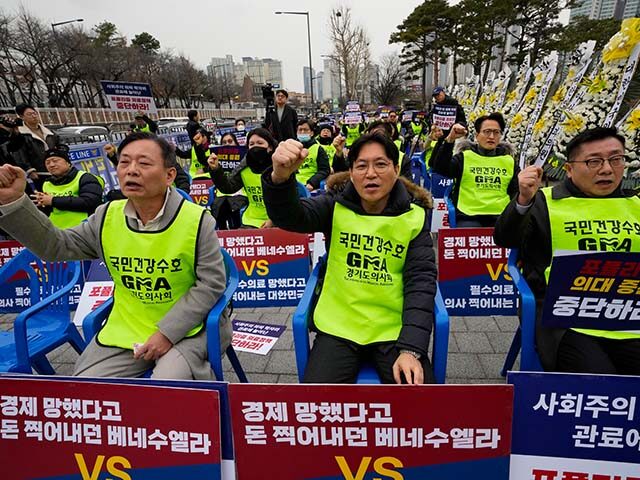Police in South Korea executed raids on the Seoul and Gangwon Province offices of the Korean Medical Association (KMA) on Friday as part of the government’s response to an ongoing nationwide strike by trainee doctors that has devastated hospitals’ ability to sustain a functional healthcare system.
South Korea is home to about 13,000 trainee doctors, interns and residents, of which about 10,000 have resigned from their posts since mid-February, or nearly 80 percent of those in the country. About 9,000 have left their posts and not returned as of Friday.
The trainee doctors perform pivotal services at hospitals, particularly in emergency rooms and aiding with surgeries. Some hospitals have reportedly canceled as many as half of scheduled surgeries and incidents of patients failing to receive critical care are mounting, despite government efforts to mitigate the consequences by expanding the authority of nurses to take on roles typically left to doctors. This week, Korean news outlets reported the case of an elderly woman who died after seven hospitals rejected the ambulance carrying her, citing the lack of doctors. The eighth hospital pronounced her dead on arrival.
The KMA accused the government of violating the doctors’ “human rights” by opposing the strike in a statement on Friday.
The doctors walked off the job in February to protest President Yoon Suk-yeol announcing a plan to increase the number of positions for students at medical schools, a move he described as essential for the future of South Korea’s healthcare system. The nation has suffered shortages in the number of doctors in key fields for years, which have been exacerbated by medical students opting for more lucrative fields such as cosmetology over critical but economically less viable specialties such as pediatrics. The pediatric field is enduring a particularly alarming shortage as doctors flee the field in response to South Korea’s record-low birth rate, the world’s lowest, leaving parents with few options to ensure the health of their children.
“Increasing the medical school admissions quota by 2,000 is the bare minimum necessary measure to ensure the state can fulfill its constitutional mandate,” Yoon said in late February. According to the president, South Korea needs “about 10,000 more doctors to secure an adequate number of doctors in areas with shortages of medical professionals to ensure fair access to health services.”
Yoon’s plan would increase the number of medical students by 2,000 in 2025 and gradually grow the field until, by 2035, South Korea would be home to an extra 10,000 medical students by 2035. Currently, South Korea’s medical schools take in 3,000 students a year.
The Yoon government sternly condemned the doctors for abandoning their posts and imposed a deadline of March 1 for those who wish to return to the job. After Friday, the Health Ministry warned, doctors would face professional and potentially legal consequences for their protest. Prior to the deadline, however, government officials filed criminal charges this week against five members of the KMA accused of “the violation of the medical law and obstruction of justice” for organizing, encouraging, and sustaining the strike. The government has not released the names of those charged.
In pursuit of that investigation, police appeared at multiple KMA offices on Friday, searching the phones and other electronics of those personally implicated. The raids followed operations to seize the phones and computers of the doctors at their homes, according to the Korea Herald.
“The ministry filed charges against the emergency committee of the major doctors’ association, accusing them of violating medical laws, criminal obstruction of justice, and instigating and abetting the mass resignations of trainee doctors,” the newspaper reported.
Most doctors did not return to their posts on Friday, the Korean Health Ministry reported, adding that it would indeed take punitive measures against those refusing to do their jobs but that processing them would take time.
“The licenses will not be immediately suspended starting next Monday. They will receive a prior notice, along with an opportunity to make statements,” Health Ministry official Kim Chung-hwan told reporters. Friday is a national holiday in South Korea, hence Kim referring to Monday as the first day for suspensions.
An estimated 565 doctors of the over 9,000 protesting have returned to work as of Friday. The Ministry stated that it had sought to hold meetings with strike leaders to negotiate an exit to the situation but the doctors had not responded with any concrete interest in doing so. Government officials had also attempted to address the doctors personally to issue Seoul’s order to return to work, but many doctors reportedly turned off their phones to complicate the government’s attempts to contact them.
The KMA issued an infuriated statement on Friday against the government’s attempts to save the country’s healthcare system from its doctors, claiming that the Yoon administration was “oppressing freedom.”
“We strongly condemn the government’s moves of oppressing freedom and human rights of doctors,” the KMA said in a statement, according to the South Korean news agency Yonhap. “We will resist for achieving freedom and making our voice heard.”

COMMENTS
Please let us know if you're having issues with commenting.